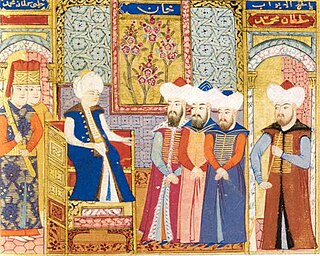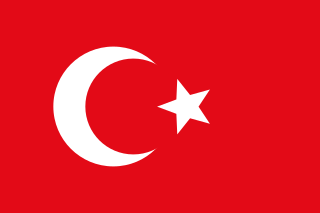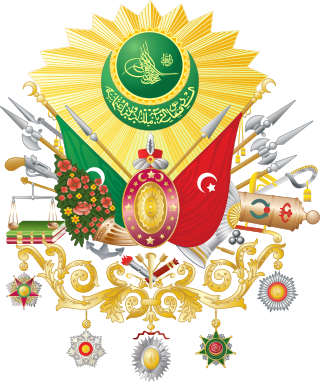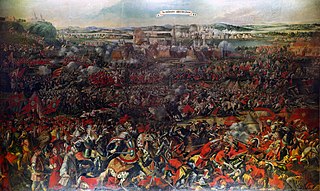Lists of battles contain links to sets of articles on battles. They may be organized alphabetically, by era, by conflict, by participants or location, or by death toll. See Category:Battles for a complete list of articles on battles.

Mehmed I, also known as Mehmed Çelebi or Kirişçi, was the Ottoman sultan from 1413 to 1421. The fourth son of Sultan Bayezid I and Devlet Hatun, he fought with his brothers over control of the Ottoman realm in the Ottoman Interregnum (1402–1413). Starting from the province of Rûm he managed to bring first Anatolia and then the European territories (Rumelia) under his control, reuniting the Ottoman state by 1413, and ruling it until his death in 1421. Called "The Restorer," he reestablished central authority in Anatolia, and he expanded the Ottoman presence in Europe by the conquest of Wallachia in 1415. Venice destroyed his fleet off Gallipoli in 1416 as the Ottomans lost a naval war.

The Ottoman Empire, historically and colloquially the Turkish Empire, was an empire that controlled much of Southeast Europe, Western Asia, and Northern Africa between the 14th and early 20th centuries. It was founded at the end of the 13th century in northwestern Anatolia in the town of Söğüt by the Turkoman tribal leader Osman I. After 1354, the Ottomans crossed into Europe and, with the conquest of the Balkans, the Ottoman beylik was transformed into a transcontinental empire. The Ottomans ended the Byzantine Empire with the conquest of Constantinople in 1453 by Mehmed the Conqueror.

The Ottoman Empire was founded c. 1299 by Osman I as a small beylik in northwestern Asia Minor just south of the Byzantine capital Constantinople. In 1326, the Ottomans captured nearby Bursa, cutting off Asia Minor from Byzantine control. The Ottomans first crossed into Europe in 1352, establishing a permanent settlement at Çimpe Castle on the Dardanelles in 1354 and moving their capital to Edirne (Adrianople) in 1369. At the same time, the numerous small Turkic states in Asia Minor were assimilated into the budding Ottoman sultanate through conquest or declarations of allegiance.

A series of military conflicts between the Ottoman Empire and various European states took place from the Late Middle Ages up through the early 20th century. The earliest conflicts began during the Byzantine–Ottoman wars, waged in Anatolia in the late 13th century before entering Europe in the mid-14th century with the Bulgarian–Ottoman wars. The mid-15th century saw the Serbian–Ottoman wars and the Albanian-Turkish wars. Much of this period was characterized by Ottoman expansion into the Balkans. The Ottoman Empire made further inroads into Central Europe in the 15th and 16th centuries, culminating in the peak of Ottoman territorial claims in Europe.

The Great Turkish War, also called the Wars of the Holy League, was a series of conflicts between the Ottoman Empire and the Holy League consisting of the Holy Roman Empire, Poland-Lithuania, Venice, Russia, and Habsburg Hungary. Intensive fighting began in 1683 and ended with the signing of the Treaty of Karlowitz in 1699. The war was a defeat for the Ottoman Empire, which for the first time lost large amounts of territory, in Hungary and the Polish–Lithuanian Commonwealth, as well as part of the western Balkans. The war was significant also by being the first time that Russia was involved in an alliance with Western Europe.

The military history of Greece is the history of the wars and battles that took place in Greece, the Balkans, and the Greek colonies in the Mediterranean Sea and the Black Sea, respectively, since classical antiquity.

The Middle Eastern theatre of World War I saw action between 29 October 1914 and 30 October 1918. The combatants were, on one side, the Ottoman Empire, with some assistance from the other Central Powers; and on the other side, the British as well as troops from the British Dominions of Australia, Canada, and New Zealand, the Russians, and the French from among the Allied Powers. There were five main campaigns: the Sinai and Palestine, Mesopotamian, Caucasus, Persian, and Gallipoli campaigns.

The Ottoman Navy, also known as the Ottoman Fleet, was the naval warfare arm of the Ottoman Empire. It was established after the Ottomans first reached the sea in 1323 by capturing Karamürsel, the site of the first Ottoman naval shipyard and the nucleus of the future Navy.
The military history of Serbia spans over 1200 years on the Balkan peninsula during the various forms of the Serbian state and Serbian military.

The Ottoman Empire came into World War I as one of the Central Powers. The Ottoman Empire entered the war by carrying out a surprise attack on the Black Sea coast of Russia on 29 October 1914, with Russia responding by declaring war on 2 November 1914. Ottoman forces fought the Entente in the Balkans and the Middle Eastern theatre of World War I. The Ottoman Empire's defeat in the war in 1918 was crucial in the eventual dissolution of the empire in 1922.

The Battle of Demotika was a battle that took place during the Byzantine civil war which began in 1352 between the forces of the Ottoman Empire and those of the Serbian Empire and Second Bulgarian Empire.